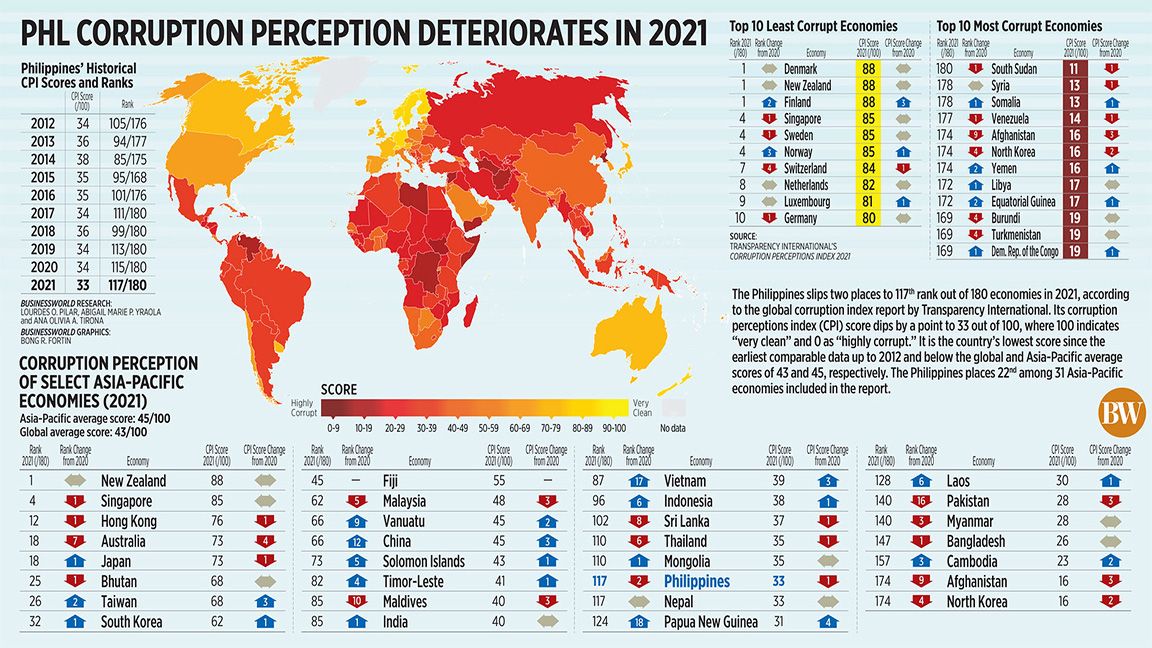The Philippines was rated 33 out of 100 by Transparency International in term of corruption index citing the restrictions to freedom of expression and association. But this was debunked by Trade Secretary Ramon Lopez who said that the Duterte administration has never curtailed freedom of expression.
Transparency International scored a ‘historic low’ of 33 out of 100 (which is cleanest) in corruption index as it noted a “sharp” decline in freedom of expression under the Duterte administration making it difficult for citizens to speak up against corrupt activities.
Based on the 2021 Corruption Perceptions Index (CPI), the Philippines dropped two spots to 117th place out of 180 countries and territories, reported BusinessWorld.
Transparency International said in a statement the Philippines scored a “historic low” of 33 out of 100 in a scale that measures perceived levels of public sector corruption. Previously, the country had a score of 34. The scale indicates 100 as “very clean” and zero as “highly corrupt.”
“With a score of 33, the Philippines is a significant decliner, having lost 5 points since 2014. Since the election of Rodrigo R. Duterte (in 2016), the Philippines has also seen a sharp decline in freedom of association and freedom of expression, making it harder to speak up about corruption,” Transparency International said.
Topping the CPI were Denmark, Finland and New Zealand, which all had a score of 88.
Below global average
The Philippines’ score is below the global average of 43 and Asia-Pacific region’s average of 45. Its highest-ever score on the CPI was 38, which was recorded in 2014.
The Philippines was behind some of its Southeast Asian neighbors in the CPI, namely Singapore (4th), Malaysia (62nd), Timor-Leste (82nd), Vietnam (87th), Indonesia (96th), and Thailand (110th).
In Asia-Pacific, Transparency International noted that corruption levels appear to be at a standstill, with 77 percent of countries seeing a decline or made little progress in the last decade.
“People across Asia-Pacific have led mass movements calling for action against corruption, but little has changed in the last 10 years. Instead, populist and autocratic leaders co-opt anti-corruption messaging to stay in power and restrict civil liberties to stop people from taking to the streets,” Ilham Mohamed, Asia regional advisor of Transparency International said.
“With weakening anti-corruption institutions, or in some cases none at all, the region is failing to uphold human rights and address corruption.”
‘Huge problem’
Trade Secretary Ramon M. Lopez said the Duterte administration has never curtailed freedom of expression, contrary to Transparency International’s claim.
“We know that’s not true. (There are) thousands of critics around and in media, and (the) administration never stopped them. (The) administration has purged a lot of those linked with corruption. President Duterte has no tolerance for corruption,” Lopez said.
However, Makati Business Club Executive Director Francisco “Coco” Alcuaz, Jr. said that the rise in perceived corruption may cause businessmen and potential investors to think twice about the Philippines.
“When freedom of expression and media freedom are curtailed and with the rise of disinformation, more and more Filipinos will be unaware of the corruption around them and unable to restore the integrity needed for a competitive, job-creating economy,” Alcuaz said.
Ser Percival K. Peña-Reyes, associate director at the Ateneo de Manila University Center for Economic Research and Development, said in a phone interview that the country’s low CPI ranking is a cause of concern.
“We really have to shape up. (We can do) anything that would foster more transparency such as the Freedom of Information bill, and automation for revenue collection agencies such as the Bureau of Customs and the Bureau of Internal Revenue,” he said.
Ateneo Policy Center Senior Research Fellow Michael Henry Ll. Yusingco said Filipinos should be more assertive in making public officials accountable for their actions by using social media. He also urged the media to be “more relentless” in monitoring government expenditures.
“Corruption is a huge problem. And it is going to take a lot of work, over many years, to defeat this scourge,” Mr. Yusingco said.
No deterrent to foreign investors
Calixto V. Chikiamco, Foundation for Economic Freedom president, said the country’s lower CPI ranking will not discourage majority of foreign investors who evaluate investments based on fundamentals.
“The fundamentals are that the administration will make the country more hospitable to foreign investments with three liberalization measures: the Public Service Act amendment, and amendments to the Retail Trade Liberalization and Foreign Investment Act,” Chikiamco said.
“Moreover, the country’s fiscal and external reserves position, although stressed by the pandemic, remain healthy. Therefore, economic recovery remains on track if the COVID-19 situation improves, irrespective of this negative report,” he added.
Tags: #TransparencyInternational, #Phlcorruptionindex, #governance

